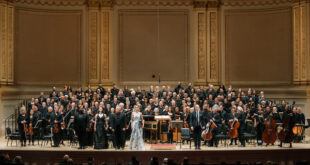 Jazz pianist Art Hirahara’s new trio album Libations and Meditations (Posi-Tone) has cracked a shell for me. I listen to a lot of jazz. I have even played some jazz (or at least tinkered around its edges) in my time. But I almost never write about it. Jazz writers typically show off a very deep, specialized knowledge, and like some (though by no means all) jazz musicians, they often convey an esoteric clubbiness that’s less than inviting to others who are interested but not expert.
Jazz pianist Art Hirahara’s new trio album Libations and Meditations (Posi-Tone) has cracked a shell for me. I listen to a lot of jazz. I have even played some jazz (or at least tinkered around its edges) in my time. But I almost never write about it. Jazz writers typically show off a very deep, specialized knowledge, and like some (though by no means all) jazz musicians, they often convey an esoteric clubbiness that’s less than inviting to others who are interested but not expert.
Accompanied on Libations and Meditations by bassist Linda Oh and drummer Jon Davis, Hirahara puts forth 11 of his own compositions with a blend of fireworks and atmospherics that sounds cutting-edge and comfortable at the same time. Reminding me here of Bill Evans, there of Dave Brubeck, and over there, in the distance, faintly of Chick Corea, these numbers possess a large measure of the warmth of some of the 20th century’s most popular jazz, but they also challenge my ears and brain.
“Father’s Song” feels like a comforting parental blanket, while a three-and-a-half minute length tames the humorous but disconcertingly herky-jerky rhythms of the appropriately titled “Be Bim Bop.” (The even shorter “Bop Bim Be,” energized like a laugh by Davis’s expert drumming and decorated with mini-quotes from classic jazz themes, forms an opposite bookend near the end of the album.) The gentle solo piece “Karatachi No Hana,” presumably inspired by a traditional Japanese song by that name, sounds to me like down-home Americana, something you’d hear Rich Dworsky play on A Prairie Home Companion. “The Looking Glass,” another solo piece, has the resonance of a jazz standard, the kind that used to derive from musical theater.
“Only Child” swings easily through the kind of natural-sounding chord changes for which Hirahara has a gift, sequences that never quite resolve when you expect them to yet always do loop back home. The contrast with the next track, the eerie “Dead Man Posed” with its Chopinesque intervals and stark dissonances amid cushiony darkness, is extreme, with Davis making the most of his malleted toms and cymbal washes. And the album’s closing track, the contemplative but motile “Nereids and Naiads,” features a melodic, heartfelt solo from Oh in 5/4 time. When a piece in an odd time signature sounds thoroughly organic you know you’re in the company of a group that’s truly playing as one.
Throughout the album the trio conveys the sense of joy that marks jazz at its best. To this non-jazz writer, Hirahara’s trio has hit it out of the park with this set.
[amazon template=iframe image&asin=B00PHWTTLC] Blogcritics The critical lens on today's culture & entertainment
Blogcritics The critical lens on today's culture & entertainment



